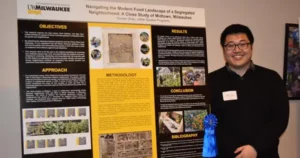Urban Studies hosted the program’s 25th Annual Student Research Forum on May 5, showcasing student research posters, panel presentations on community collaborations and urban research, and talks about the history of “nonprofit neighborhoods” and urban inequality.
In the UWM Union Alumni Fireside Lounge, urban studies majors enrolled in the 600 Capstone Seminar in Urban Studies course presented their semester-long research during a juried poster session along with graduate students in urban studies and architecture.
The afternoon event included a panel presentation titled, “Community Collaborations and Methods of Urban Research,” moderated by professor of architecture and urban studies Arijit Sen, and presentations on the Cherry Street Community Garden project in the Midtown neighborhood by his field school students: Liam Farin (urban studies major and undergraduate fellow), urban studies PhD students Maria Francis and Yuchen Zhao, and Hidayah Osman (architecture major and undergraduate fellow).
Nateya Taylor, working toward her Master’s in urban studies, presented her 15-minute documentary that she directed, wrote, narrated, and edited, titled: “The Good Land: Muneer Bahauddeen – Vision” and held a talk back following the screening. The documentary examines the life and work of a Milwaukee public artist and emphasizes the need to showcase more of the positive changes happening in Milwaukee’s Black community.
This year’s keynote speaker was Dr. Claire Dunning, an historian and assistant professor at the School of Public Policy at the University of Maryland, College Park. She is the author of Nonprofit Neighborhoods: An Urban History of Inequality and the American State (University of Chicago Press, 2022). Her talk, “Nonprofit Neighborhoods: Solving Urban Problems in Public and Private,” discussed the federal government’s shift in funding and urban governance to nonprofits in the 1960s, and the ways that influenced political and economic activity and shaped urban inequality for decades to come. A reception followed the address.
